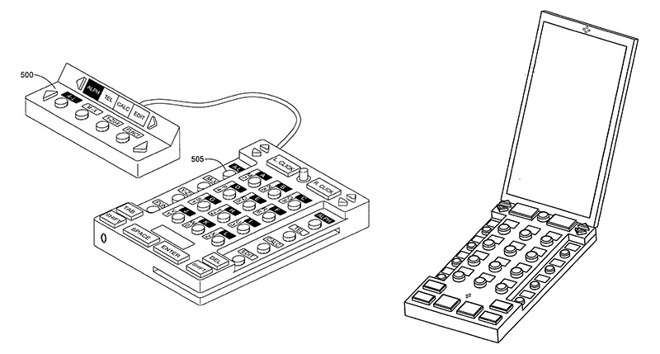Apple has filed a lawsuit to force the courts to declare that it isn't violating a patent that is being used against it in another lawsuit, seemingly related to the touchscreen keyboard on an iPhone or iPad.

Illustration of Higginson's "Universal keyboard." | Source: USPTO
The parent suit that Apple is acting against was filed in June, and alleges that Apple stands in violation of U.S. Patent No. 6,703,963 for a "Universal keyboard."
Inventor Timothy Higginson, through patent holding company Princeps, believes that the '963 patent resolves "technical problems related to data input devices, and particularly, to problems related to the utilization of small profile data input devices." More specifically, the input device adapts the QWERTY keyboard for one-handed or two-thumb use, and is specifically applicable to how Apple has implemented the keyboard in the iPhone and iPad.
Apple notes in the suit that modifications that Higginson made to the patent after a refusal by the USPTO in 2003 prior to the award in 2004 are the key to Apple's defense and nonviolation. In the court filing, Apple delves heavily into minutiae of patent wording, saying that the execution in the iPhone isn't the same as the patent filing, mostly for reasons of varying "domain controls."
While the patent spells out use of Esc, Alt, Ctrl, Shift, Caps Lock, Tab, Enter, Backspace as inclusive domain controls, it says nothing about additions beyond those to modify how a keyboard works and what is presented to the user. Apple specifically cites the Globe and Emoji controls appearing in the lower left of the keyboard as unique domain controls, specific to Apple's keyboard use, which allegedly make it sufficiently different from the patent.
Princeps is a non-practicing entity -- or what Apple calls a "patent assertion entity" -- created to litigate and enforce Higginson's patents in court actions. The firm owns six properties invented by Higginson that were previously assigned to the now defunct consultancy Yuvee.
Higginson is demanding damages and legal fees in the original suit, through Princeps. Princeps is also suing Asus, Google, and Samsung over the same patent. Apple is seeking legal fees and a proactive declaration that it is not violating the patent -- which was originally denied because of prior art and obviousness prior to Higginson's changes.
Apple Versus Princeps Interface Technologies by Mike Wuerthele on Scribd


